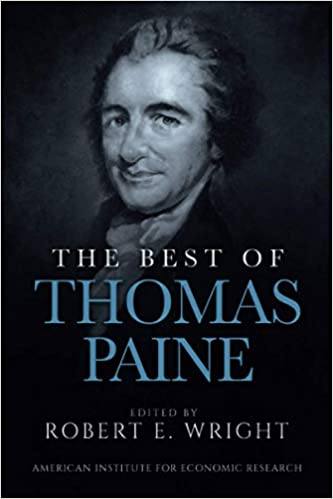Thomas Paine, Debt Realist and Political Economist Extraordinaire

In 1776, an age when social media entailed spending a few hours in the evening in the local tavern listening to printed materials read aloud by those fortunate enough to be able to read, Thomas Paine was a blue checkmark account, a million follower maven who coalesced public sentiment for independence from Great Britain and then bucked up the troops for their crucial counterattack at Trenton. He was much more than a mere firebrand, though, expressing key notions of political economy before other American statesmen did.
One of the young rebels who risked his life for freedom by backing independence and crossing the icy Delaware with General George Washington on Christmas night 1776 was Alexander Hamilton. Later, as Treasury Secretary, Hamilton, backed by President Washington, implemented a series of controversial policies that jump started America’s economic miracle. I detail those policies in One Nation Under Debt (2008) and other books.
Hamilton was, in the terminology of public debt expert and author of The Political Economy of Public Debt Richard Salsman, a “debt realist.” Hamilton summarized his view of sovereign debt in an (in)famous 1781 letter to financier Robert Morris, in which he wrote that “A national debt, if it is not excessive, will be to us a national blessing; it will be a powerful cement of our union.”
Hamilton, like Morris and other debt realists, realized that government borrowing was rational if the benefits of borrowing, like winning independence, exceeded the costs, which would remain small so long as the debt remained easy to service. By cement of the union, Hamilton meant that bondholders would have a strong incentive to make the new nation work, if only so they would get paid as promised.
As Salsman shows, debt realism was a controversial view throughout history because most policymakers and political economists argued that all sovereign debt is economically and morally pernicious or, at the other extreme, that governments can and should borrow as much as they want, especially if they also print money, because it will have few untoward effects. Both extreme views remain silly but are still widely held to this day.
Interestingly, Hamilton closely paraphrased Paine, who wrote in 1776 that “No nation ought to be without a debt. A national debt is a national bond; and when it bears no interest, is in no case a grievance.” Paine later excoriated the leaders of his homeland, Great Britain, not for borrowing per se, but for borrowing too much. He accurately predicted that the Bank of England would have to stop specie payments, which held off only two months longer than Paine anticipated.
Paine shared with Hamilton a distrust of fiat paper money, suffering through painful hyperinflations in America and France during their revolutions. Like Hamilton, he espoused private bank money (notes and deposits) convertible into gold or silver at a known, fixed rate and backed by the bank’s entire portfolio of assets, which in addition to precious metals should primarily be composed of short-term discount loans and government bonds and other liquid securities.
The author of Common Sense, like Hamilton and Chief Justice John Marshall, thought it common sense that governments should not renege on any of their contracts, including the promises they made in corporate charters. Paine excoriated Pennsylvania in 1786 for revoking the charter of the Bank of North America in terms that Marshall would use in his famous 1819 decision in the Dartmouth College case. If governments could abrogate charters, all three great statesmen knew, “It will lead us,” as Paine wrote in Dissertations on Government, “into a wilderness of endless confusion and insurmountable difficulties.” Nothing short of the “glory” of the Republic was at stake, because if the government could renege on its promises individuals could become “the prey of power” as “MIGHT” overcame “RIGHT.”
Paine and Hamilton also shared an affection for efficient government, one that concentrated on providing core public goods as inexpensively and unobtrusively as possible. Harvey Flaumenhaft has a lovely book about Hamilton’s administrative policies called The Effective Republic. Paine probably influenced Hamilton’s thinking here as well, by quoting in his widely read pamphlets a now too-little-known* Italian thinker named Giancinto Dragonetti to the effect that “The science of the politician consists in fixing the true point of happiness and freedom. Those men would deserve the gratitude of ages, who should discover a mode of government that contained the greatest sum of individual happiness, with the least national expense.”
Paine’s remarkably accurate and pithily expressed ideas about political economy can now be found in a convenient edition of his work, The Best of Thomas Paine, published by AIER and edited by yours truly.
*Dragonetti appears only in the Italian version of Wikipedia but some English-language scholarship on his ideas are available, as is an English translation of his book On Virtues and Awards.











